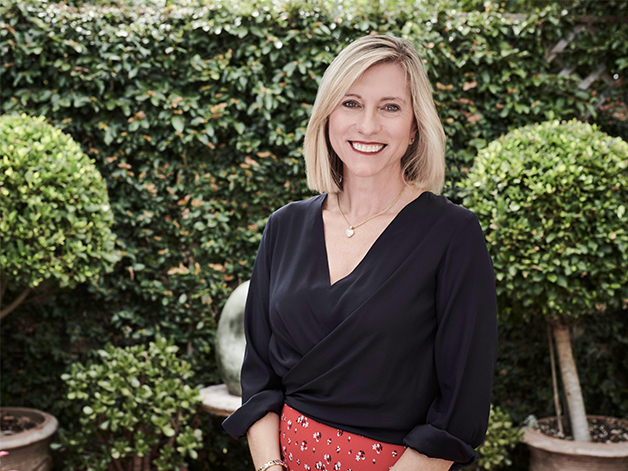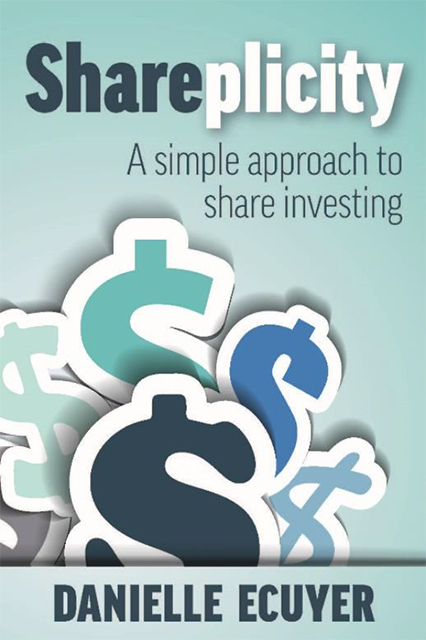Shareplicity

A simple approach to share investing
"Highly recommended for both new and experienced investors"
Martin Roth, bestselling author of Top Stocks
With property prices continuing to climb, and interest on cash in the bank at all-time lows, more and more smart investors are looking at shares as an investment option, even in the bear market we're in now. But with a plethora of share options available, how do you know where to start and what to invest in for long term financial success?
In the new book, Shareplicity (Major Street Publishing $29.95), author Danielle Ecuyer distils four-decades of global share market experience as an adviser and client into an easy-to-follow, introductory guide to investing in the share market. Shareplicity educates and informs both new and existing investors, challenges the status quo of Australian 'blue chips', and provides up-to-date data and advice on dividends and 21st century investment themes.
If you've been considering getting into investing, Ecuyer points out that now is a good time to learn more about shares, pointing out that:
• Shares have consistently produced above average long-term performance
• You don't need large sums of capital to start investing in shares
• There are no hassles or stress over debt and mortgages, no tenants and no maintenance costs as there are with property investing
• There's potential for capital appreciation and income streams.
Whether you're saving for a deposit, a holiday, the kids' education or a comfortable retirement, Shareplicity empowers you with the knowledge needed to start your investment journey and secure a stronger financial future.
About the Author Danielle Ecuyer trained as a share equities analyst in the late 1980s, before relocating to London in the 1990s where she transitioned her expertise to Institutional Emerging Markets. She worked in senior positions at some of the world's most prestigious investment firms, advising some of the world's largest investment companies, before returning to Australia in 2003 to raise her son. Since then, Danielle has used and expanded her skills for her own investment portfolios covering the Australian and US Markets.
Shareplicity
Book Author: Danielle Ecuyer
RRP: $29.95
Twitter: https://twitter.com/au_shareplicity
 Author Danielle Ecuyer talks on Share tips
Author Danielle Ecuyer talks on Share tips
What was your motivation to write Shareplicity?
Danielle Ecuyer: For most of my life I have wanted to write a book and the most obvious route seemed a book on share investing, as that has been the mainstay for most of my life since leaving university.
I experienced my mother lose most of her money on a share called Poseidon in the early 1970's, one of the most speculative mining bubbles in Australia's share history. I wanted to create an easy to read book for both new and existing investors that would not only help them develop the skills and the knowledge for real wealth creation through share investing, but also learn how to avoid those crippling losses that my mother experienced.
As someone who has successfully transitioned from a professional career in Institutional stock broking to running my own money, I felt I would be able to add value that other advisers and authors cannot achieve. Shareplicity is more than a reference book as I intertwine my own stories of success and failure to bring share investing to life for the readers.
What are the main pitfalls of shares?
Danielle Ecuyer: Most of the 2300 or so shares listed on the Australian stock exchange will not make you money, or if they do it is only a temporary phenomenon. The problem for new investors is that they only ever hear about the winning shares, the ones that make a friend so much money, that they feel compelled to brag about it. You will often never hear about the loss-making shares, that investors refuse to sell and just sit like a bad smell in sock draw of what could have been. The volatility in share prices is also daunting for new investors. They buy a share, the price falls and immediately they feel they have done the wrong thing. Then panic sets in, they sell the share, only to see it rise. The way shares play on our emotions is one of the main pitfalls. So, all investors need a plan of what they are trying to achieve and what are the best pathways to achieve their goals, that work with their risk tolerance. Any investment is risky and too often the risks of share investing are under appreciated with the lure of a hot tip!
Why would you recommend shares over property investment?
Danielle Ecuyer: The first aspect to understand is both shares and property are not risk-free investments i.e. making money isn't always a sure thing. However, shares have a few distinct advantages over property. The first and one of the most important, as investors are finding out during the pandemic is liquidity- the ability to buy and sell the investment. Shares are traded 5 days a week and can be sold easily at a low cost. Property is a much more capital-intensive investment, that cannot be bought or sold on an electronic exchange like shares. So, if you need to access your money quickly, it is a lot harder and more costly to sell a property than shares. The second aspect is the amount of money needed. You can start share investing with as little as $500 and add to it whenever. To buy a property requires a large cash deposit, a secure income to obtain a mortgage and properties require ongoing capital to maintain the asset. Shares pay regular dividends, (income), properties need reliable tenants to pay you an income.
What sort of returns can shares give over what period?
Danielle Ecuyer: According to Marketindex.com.au, the Australian share market has returned 11.8% p.a. since 1900 including dividends. This means you will more than double your money over 7 years, if you invested the dividends (income).
Excluding dividends, the returns would be of the order of around 7-8% p.a., meaning the value of your investment would double after 10 years.
When looking at the returns from shares, you need to consider the capital appreciation in the price of the share and the dividend received. According to the Westpac, since 1980 the return on shares was 8.78% and property 7.16%, p.a. Source (Westpac: Safe as Houses? 150 years of returns revealed, January 11, 2018). The returns sometimes vary depending from which start year they are calculated, so on balance it is probably safe to assume a 7% average return before dividend income is reasonable in a low interest world.
How important is research when considering which shares to buy and trade?
Danielle Ecuyer: It is very important to do your research when looking at which shares to buy or trade. It is also important to understand the reasons for which you are buying the shares, is it for capital growth (price appreciation0? Is it for dividend income? Is it a share that is reliable and a strong business that will let you sleep well at night? Or are you buying for a quick trade based on rumour or speculation? Once you know what you are seeking then you can match your investment expectations and risk tolerance to what shares you buy and how much you buy of them. Sometimes a hot tip can turn out to be a great buy, but be careful of only pursuing hot tips, more often than not they will be loss makers. I often buy a small amount of a share and after seeing how the management perform, I sell or add to the position. No amount of research can offset investing experience and getting to know the companies you invest in, which comes with time.
Can you give us your top 3 tips when entering the share market?
Danielle Ecuyer:
- Set your goals- why are you investing? How much money and time do you have available to invest? Are you trying to create long-term wealth or just generate quick profits?
- Find reliable information sources and do your research- knowing who to trust is very important and that can take some time to work out the different styles of share investment advice on offer and what works for you.
- Spread the risk- never put all your money into one share or never invest what you are not prepared to lose if you are trading small speculative shares. No one wants to lose all their savings, so it is better to spread the risk across a number of shares. If you don't have a lot of money to invest at the beginning it is better to buy an ETF (exchange traded fund) for the Australian share market and add to it over time. As your savings grow with your experience of the share market you can start to invest directly into shares.
MORE



